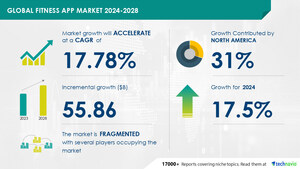NEW YORK, July 10, 2024 /PRNewswire/ -- The global plastic fasteners market size is estimated to grow by USD 1.36 billion from 2024-2028, at a CAGR of 4.5%, driven by cost advantages and the popularity of lightweight solutions. However, stringent regulations against plastic use pose a challenge. The use of recycled materials enhances market performance by aligning with environmental regulations and reducing raw material costs. Key players include Anil Plastics and Enterprises, Avery Dennison Corp., Bossard Holding AG, Bulte Plastics (UK) Ltd., and others.
Get a detailed analysis on regions, market segments, customer landscape, and companies - Click for the snapshot of this report
Forecast period |
2024-2028 |
Base Year |
2023 |
Historic Data |
2018 - 2022 |
Segment Covered |
End-user (Automotive, Electrical and electronics, Building and construction, Supermarkets, and Others) and Geography (APAC, Europe, North America, South America, and Middle East and Africa) |
Region Covered |
APAC, Europe, North America, South America, and Middle East and Africa |
Key companies profiled |
Anil Plastics and Enterprises, Avery Dennison Corp., Bossard Holding AG, Bulte Plastics (UK) Ltd., Canco Fasteners, Craftech Industries Inc., E and T Fasteners, Essentra Plc, Fontana Finanziaria Spa, Illinois Tool Works Inc., KITAGAWA INDUSTRIES America Inc., LISI Group, MW Industries Inc., Nifco Inc., Nyltite Corp., Penn Engineering, Raygroup SASU, Slidematic Precision Components Inc., Stanley Black and Decker Inc., and Volt Industrial Plastics |
Key Market Trends Fueling Growth
Plastic fasteners are manufactured using materials like nylon, PVC, and polypropylene. These lightweight fasteners are widely utilized in the construction industry due to their effectiveness. In electronics, they are essential for forming circuit boards, serving functions such as spacing, securing, guiding, and supporting components. Plastics' electrical insulation properties make them a preferred choice over other fasteners. Versatile plastics cater to various applications where weight, thermal, environmental, chemical, and electrical considerations are crucial. They simplify designs by replacing multiple metal components with a single plastic fastener. The automotive industry, which employs advanced automation techniques, further increases the demand for lightweight, reliable, and efficient components, driving the plastic fasteners market growth.
The Plastic Fasteners Market is experiencing significant growth, particularly in the Electronics and Automotive industries. Plastic materials like nylon, polypropylene, polyethylene, ABS, and PVC are popular choices due to their lightweight and durability. Recycled materials are also gaining traction due to environmental concerns. In the Automotive segment, plastic fasteners are used in grommets & bushings, threaded fasteners, cable clips & ties, washers & spacers, wall plugs, and more. The Plastic Compounding Market and Bio-based Elastomers Market are key suppliers. Metal fasteners face competition due to plastic's advantages in weight reduction and cost savings. End-use industries include Consumer Electronics, Green Building, and Electric Vehicles. Government bodies and environmental regulations are driving the shift towards sustainable materials. Plastic parts replace flimsy materials in automobiles, reducing vibration, abrasion, and corrosion. The market includes hole plugs, nylon washers, and various types of fasteners for electrical and electronics, insulating materials, bumpers, and light sheet metals.
Discover 360° analysis of this market. For complete information, schedule your consultation- Book Here!
Market Challenges
- The European Union's Regulation (EC) 282/2008, enacted on March 27, 2008, sets guidelines for plastic materials and articles that come into contact with food, including plastic fasteners. These regulations require authorization for recycling processes to produce food-grade plastics. Applications for authorization are submitted to Member State authorities, then forwarded to the European Food Safety Agency (EFSA) for an opinion. The EC grants or refuses authorization based on EFSA's opinion. Such stringent regulations can limit the use of plastic fasteners in industries like supermarkets, negatively impacting the growth of the global plastic fasteners market during the forecast period. Regulatory bodies like the European Commission (EC), Registration, Evaluation, Authorization, and Restriction of Chemicals (REACH), and Environmental Protection Agency (EPA) continue to enforce regulations on plastics, potentially impeding market expansion.
- The Plastic Fasteners Market faces several challenges in various industries. In the automotive segment, plastic parts and light sheet metals require fasteners that can withstand vibration, abrasion, and corrosion. For bumpers and hole plugs, flimsy materials necessitate strong and reliable solutions. In insulating materials, plastic washers and spacers like nylon washers play a crucial role. Government bodies and environmental regulations impose stringent rules, affecting production costs and credit conditions in the construction sector. In non-residential manufacturing, plastic grommets and bushings are essential for Building and Construction, Residential manufacturing, and Non-residential manufacturing. In the Automotive sector, plastic fasteners replace metal equivalents in automotive parts and packaging technology. Plastic binders, circuit boards, washing machines, household appliances, and auto parts also utilize plastic fasteners. The Plastic Binder's Market is a significant sub-segment, presenting both opportunities and challenges.
For more insights on driver and challenges - Download a Sample Report
Segment Overview
This plastic fasteners market report extensively covers market segmentation by
- End-user
- 1.1 Automotive
- 1.2 Electrical and electronics
- 1.3 Building and construction
- 1.4 Supermarkets
- 1.5 Others
- Geography
- 2.1 APAC
- 2.2 Europe
- 2.3 North America
- 2.4 South America
- 2.5 Middle East and Africa
1.1 Automotive- Plastic fasteners are essential components in the automotive industry, replacing metal counterparts in various applications. The global automotive sector is the largest consumer of plastic fasteners due to their use as lightweight materials in automotive structural, exterior, and interior components. These materials are utilized in manufacturing automotive parts such as instrument panels, air intake manifolds, engine covers, airbag containers, powertrains, cooling systems, headlamp bezels, exterior parts like front-end grilles, fuel caps and lids, door and tailgate handles, exterior mirrors, wheel covers, and trim. Additionally, plastic fasteners are employed in producing seat belts, airbags, carpeting, headrests, cup holders, and side pillars. The increasing demand for lightweight, fuel-efficient, and eco-friendly vehicles due to stringent environmental regulations on emissions drives the growth of the automotive industry and, consequently, the global plastic fasteners market. Key players in the automotive sector, including Jaguar Land Rover Ltd., BMW AG, Ford Motor Co., and Renault SA, have significant manufacturing hubs worldwide, leading to increased demand for plastic fasteners from these automobile manufacturers.
For more information on market segmentation with geographical analysis including forecast (2024-2028) and historic data (2018 - 2022) - Download a Sample Report
Research Analysis
The Plastic Fasteners Market encompasses the production and distribution of plastic components used to join or affix parts together in various industries. Plastic fasteners have gained popularity due to their lightweight and corrosion-resistant properties, making them ideal for the Electronics and Automotive industries. Plastic materials used in fasteners include nylon, polypropylene, and polyethylene, among others. Recycled materials are increasingly being used to reduce environmental concerns. However, plastic fasteners face competition from metal equivalents. In the Automotive sector, they are used in automobiles, electrical and electronics, plastic parts, light sheet metals, insulating materials, and more. In Residential and Non-residential manufacturing, they are used in a wide range of applications, from hole plugs and nylon washers to flimsy materials like belly buttons. Plastic fasteners also find use in Packaging technology, providing a more cost-effective alternative to metal fasteners. Despite their advantages, plastic fasteners face challenges such as their perceived flimsy nature compared to metal fasteners. Overall, the Plastic Fasteners Market continues to grow, driven by the increasing demand for lightweight and cost-effective solutions in various industries.
Market Research Overview
The Plastic Fasteners Market encompasses a wide range of products used in various end-use industries, including electronics and automotive. Plastic materials, such as nylon, polypropylene, polyethylene, ABS, and PVC, are commonly used in the production of plastic fasteners. Recycled materials are increasingly being used to reduce environmental concerns. In the automotive industry, plastic fasteners are replacing metal equivalents due to their lightweight properties, contributing to the production of fuel-efficient and electric vehicles. Plastic fasteners find extensive applications in consumer electronic devices, green building, and electrical and electronics. The market includes grommets & bushings, threaded fasteners, cable clips & ties, wall plugs, and various plastic parts like washers & spacers. The plastic compounding market and bio-based elastomers market are significant contributors to the production of plastic fasteners. The automotive segment is a major consumer, with environmental regulations and government bodies driving demand. Construction expenditure, loan rates, and credit conditions influence the market in the building and construction sector. Plastic washers and spacers, grommets and bushings, and building and construction are key applications. The plastic binder's market also utilizes plastic fasteners for various applications, including packaging technology, circuit boards, washing machines, household appliances, and auto parts. Plastic fasteners offer advantages over flimsy materials, providing resistance to vibration, abrasion, and corrosion.
Table of Contents:
1 Executive Summary
2 Market Landscape
3 Market Sizing
4 Historic Market Size
5 Five Forces Analysis
6 Market Segmentation
- End-user
- Automotive
- Electrical And Electronics
- Building And Construction
- Supermarkets
- Others
- Geography
- APAC
- Europe
- North America
- South America
- Middle East And Africa
7 Customer Landscape
8 Geographic Landscape
9 Drivers, Challenges, and Trends
10 Company Landscape
11 Company Analysis
12 Appendix
About Technavio
Technavio is a leading global technology research and advisory company. Their research and analysis focuses on emerging market trends and provides actionable insights to help businesses identify market opportunities and develop effective strategies to optimize their market positions.
With over 500 specialized analysts, Technavio's report library consists of more than 17,000 reports and counting, covering 800 technologies, spanning across 50 countries. Their client base consists of enterprises of all sizes, including more than 100 Fortune 500 companies. This growing client base relies on Technavio's comprehensive coverage, extensive research, and actionable market insights to identify opportunities in existing and potential markets and assess their competitive positions within changing market scenarios.
Contacts
Technavio Research
Jesse Maida
Media & Marketing Executive
US: +1 844 364 1100
UK: +44 203 893 3200
Email: [email protected]
Website: www.technavio.com/
SOURCE Technavio

WANT YOUR COMPANY'S NEWS FEATURED ON PRNEWSWIRE.COM?
Newsrooms &
Influencers
Digital Media
Outlets
Journalists
Opted In




Share this article